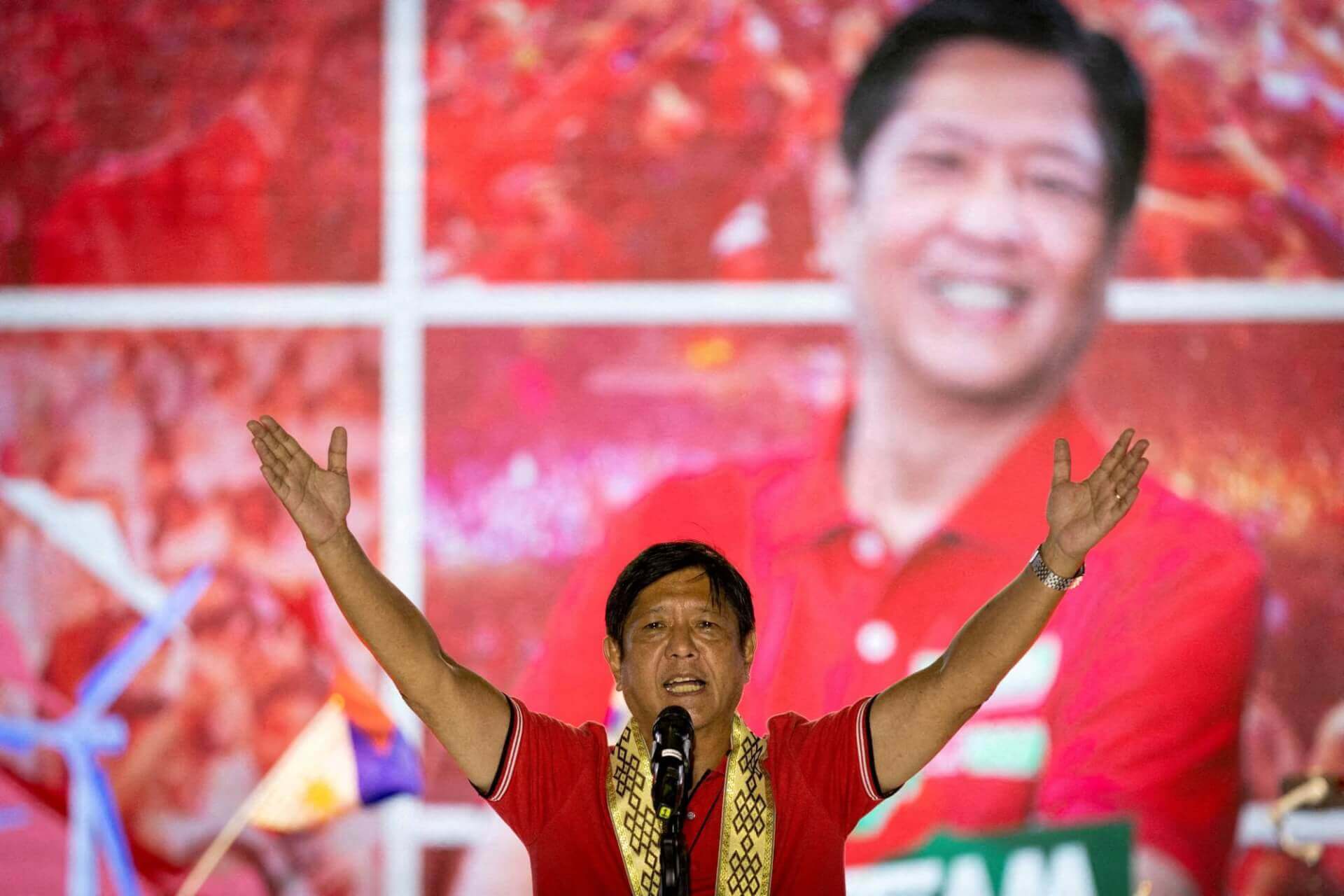Ferdinand Marcos Jr., popularly known as “Bongbong,” secured a resounding victory in the Philippines’ presidential election on Monday. An unofficial tally showed that Marcos had surpassed the 27.5 million votes needed to secure a majority.
“I hope you won’t get tired of trusting us. We have plenty of things to do. An endeavour as large as this does not involve one person,” Marcos told supporters in an address streamed on Facebook, a platform that was at the centrepiece of his political strategy.
The day after the Philippines election and the country is in a mood. Jubilation, shock, sorrow. There are many implications of a Marcos presidency but this quote by @ariesarugay has stuck with me. https://t.co/DgiqunxsUB pic.twitter.com/nDMKIWladp
— Sui-Lee Wee 黄瑞黎 (@suilee) May 10, 2022
With 29.9 million votes after 93.8% of the eligible ballots have been counted, Marcos Jr. has double that of Vice President Leni Robredo, according to the unofficial Commission on Elections (COMELEC) tally. A high voter turnout of about 80% caused long queues at polling centres, made worse by the reported malfunctioning of around 106,000 counting machines. An official result is expected to be released towards the end of the month.
Despite Marcos Jr.’s wide popularity, there has also been huge support for his opponent, Vice-President Leni Robredo. Earlier this week, over 780,000 people gathered at a rally in Quezon City.
VIDEO: The Philippines' presidential candidate Leni Robredo addresses her supporters after her opponent, the son of late Philippine dictator Ferdinand Marcos, cements a landslide election victory pic.twitter.com/qJKbIwZWlH
— AFP News Agency (@AFP) May 10, 2022
A career politician, the 64-year-old Marcos Jr. has served as a governor, congressman, and senator. His six-year presidency is expected to be somewhat of an extension of the presidency of outgoing leader Rodrigo Duterte, whose hardline approach helped him gain popularity and helped him consolidate power rapidly.
Though Marcos Jr. campaigned on a vague platform of unity, political analysts opine that his leadership is unlikely to foster this form of change, as the Marcos family name is synonymous with a brutal martial rule and plunder. His father, Ferdinand Marcos, was a former dictator who ruled the country from 1965 to 1986.
WATCH: Just like in the other rallies, the rains stopped when VP Leni Robredo started talking at the Takder Kordi rally in Baguio. pic.twitter.com/UirRuuYNDV
— Gerard de la Peña (@gerarddelapena) May 2, 2022
Marcos Jr.s’ win marks the family’s return to power, 36 years after it was forced to retreat into exile during a “people power” uprising in 1986. Despite its disgraceful fall from power, the powerful family returned from exile in the 1990s and has remained an influential force in the country’s politics by retaining its relevance with vast wealth and connections.
The incoming leader also secured a major coup after naming Duterte’s daughter, Sara Duterte-Carpio, as his running mate. An unofficial count showed that Duterte-Carpio had won the vice presidency with more than triple the votes of her nearest opponent. Critics, however, worry that their joint victory could exacerbate issues of corruption and give rise to concerns about nepotism.
READ: The Commission on Elections en Banc dismisses the 3 disqualification cases against Ferdinand "Bongbong" Marcos, Jr. | via @RG_Cruz12479 pic.twitter.com/0OGnGiGmRr
— ABS-CBN News (@ABSCBNNews) May 10, 2022
Meanwhile, outgoing president Rodrigo Duterte Duterte leaves behind a legacy of taking a strongman approach to combatting drugs and crime in the country. According to the Chief Prosecutor of the International Criminal Court, between 12,000 and 30,000 civilians were killed within Duterte’s first three years in office during his war on drugs campaign. In the first six months alone, vigilantes allegedly killed three times as many people as during Ferdinand Marcos’s era of martial law during the 1970s and 80s. Duterte, who is constitutionally barred from running for re-election, has announced his retirement from politics.
The new leader has indicated that while he does not wish to be labelled as ‘soft on crime,’ he hopes to de-emphasise the brutal crackdown that has disgruntled a growing number of citizens.
Philippines Marcos dynasty timeline.
— AFP News Agency (@AFP) May 10, 2022
Ferdinand Marcos Jr, whose dictator father and namesake plundered and brutalised the Philippines, has reached the endgame of a decades-long campaign to rehabilitate the family brand: the presidency#AFPgraphics pic.twitter.com/6G8gmpWH6G
On the foreign policy front, political analysts expect Marcos Jr to continue taking forward Duterte’s multi-billion-dollar infrastructure upgrade project and seek close ties with China. He will also have to formulate a clear strategy on the Visiting Forces Agreement with the United States, given that Duterte has repeatedly backed away from terminating the deal. The 1998 agreement provides a framework that extends legal status to thousands of US troops in the Philippines for military exercises and humanitarian assistance.

